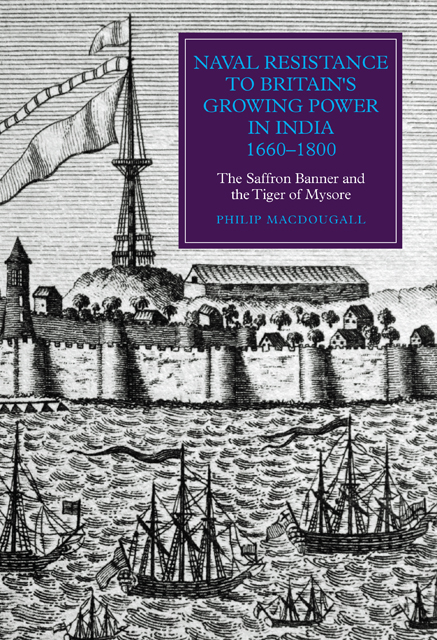 Naval Resistance to Britain's Growing Power in India, 1660–1800
Naval Resistance to Britain's Growing Power in India, 1660–1800 Book contents
- Frontmatter
- Contents
- List of Illustrations
- Abbreviations
- Chronology
- Maps
- Preface
- Part I Early Naval Resistance: The Historical Background
- Part II The Saffron Banner: Irregular Naval Warfare against an Emergent Britain
- Part III The Tiger of Mysore: A Conventional Navy to Oppose British Dominance
- Conclusion
- Bibliography
- Index
- Worlds of The East India Company
Introduction
Published online by Cambridge University Press: 23 February 2023
- Frontmatter
- Contents
- List of Illustrations
- Abbreviations
- Chronology
- Maps
- Preface
- Part I Early Naval Resistance: The Historical Background
- Part II The Saffron Banner: Irregular Naval Warfare against an Emergent Britain
- Part III The Tiger of Mysore: A Conventional Navy to Oppose British Dominance
- Conclusion
- Bibliography
- Index
- Worlds of The East India Company
Summary
The last of the Indian states to develop a navy with the potential to resist the growing power of the EIC was Mysore. This was during the mid- to late eighteenth century, with the rulers of Mysore, Haidar Ali (1760–82) and Tipu Sultan (1782–99), recognising the dangers to native sovereign states that resulted from the British gaining a secure foothold on Indian soil. In particular the rulers of Mysore, a rapidly growing state in possession of much of the Malabar Coast south of Karwar, felt especially threatened by the EIC, whose fortified factories, presidencies and alliances with other native rulers could eventually isolate and overwhelm the continuing independence of Mysore.
It was for this reason that Mysore, under the leadership of Haidar Ali and Tipu Sultan, clashed with the EIC and British on no fewer than four occasions. Undoubtedly, the root cause was a desire on the part of both Mysore and the British to expand the extent of the territory over which they had either direct power or a high degree of influence. For their part, both Haidar Ali and his son Tipu Sultan realised that only through neutralisation and eventual expulsion of all overseas colonial powers from the entire Indian sub-continent could their particular ambitions be realised. Of these four conflicts, it is invariably the Fourth Anglo-Mysore War (1798–99) that receives most attention. In part, this was due to Arthur Wellesley, the future 1st Duke of Wellington, gaining his first battle honour at the siege and fall of Srirangapatnam, Tipu’s capital. It was during the siege that Tipu himself was killed, so bringing an end to the father and son dynasty and also ensuring that Mysore was firmly brought within the sphere of British influence. While not wishing to diminish the importance of these events, the attention placed on Wellington has resulted in a frequent failure to appreciate the role of sea power in these various conflicts together with its underpinning of the growth of the short-lived independent Mysore state.
Through the fact of the EIC being already in possession of those strongly defended bases of Bombay, Bengal and Madras, with the first two well out of reach of a direct land attack from Mysore, it became necessary for the rulers of Mysore to develop a very different policy towards the EIC than that pursued by either the Mughals or Marathas.
- Type
- Chapter
- Information
- Naval Resistance to Britain's Growing Power in India, 1660–1800The Saffron Banner and the Tiger of Mysore, pp. 135 - 138Publisher: Boydell & BrewerPrint publication year: 2014
